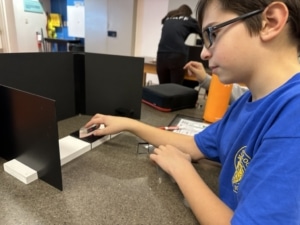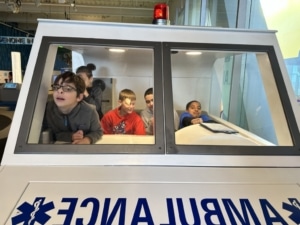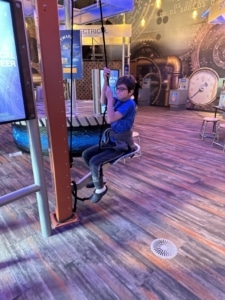I chaperoned my son’s field trip to the Connecticut Science Center last week.
Hundreds of kids from at least three schools migrated through the building in loud, energetic waves.
I do not envy the docents in that museum. They must monitor their exhibits and children’s often less-than-ideal ways of interacting with them.
Still, that doesn’t mean you need to go to war with lowly chaperones like me when things aren’t going well, which is precisely what happened.
Twice.
Early in the morning, a group of students were running through an exhibit, acting like children. They were not kids to whom I was assigned, but they were students from Charlie’s school. A docent approached and said, “Kids can’t just run through the exhibits.”
He spoke to me with anger and outrage. He wasn’t polite or even civil.
I could’ve pointed out that I was a lowly chaperone, herding my small band of misfits through the museum, so perhaps he should take his complaints to someone with more authority.
I could’ve mentioned that the offending children didn’t know me at all, so jumping in and scolding them might not be advisable.
Instead, I said:
“I think you should find a better way to speak to me.”
This was something said to me by a college professor in 1996. I was annoyed that he was continually late for class and constantly canceling entire class sessions. Eventually, I began tracking attendance data on the professor, which resulted in a front-page piece in the school newspaper, The Live Wire, exposing his lack of professionalism, which caused a stir on campus and angered the college’s president.
He told me that I should’ve brought my concerns to him rather than using the power of the pen to bring this injustice to light.
But during my first encounter with this professor, I asked why he couldn’t make it to class on time.
He said, “I think you should find a better way to speak to me.”
He was a lazy, unprofessional, useless educator, but I liked his response, filed it away, and have used it many times since.
In response to my request, the docent said, “We can’t just have kids running through the museum.”
More disdain. Condescension, even.
I said, “I’m still waiting for you to find a better way to speak to me.”
He walked away, presumably in search of someone whom he could more effectively bully.
A student standing beside me, listening to the encounter, said, “That was pretty good.”
I explained to the student three things:
- A kinder, gentler approach might have been better. The guy was just trying to do his job.
- I’ve used that response many times before. If you want to win arguments, you need to find and remember the best comebacks because, in the midst of a heated moment, a good comeback can sometimes be hard to find.
- The kinder, gentler response is almost never as fun.
The student smiled and said, “I just learned a lot. Thanks.”
It’s always good to be appreciated.
Later in the day, a different docent appeared by my side with three downtrodden children. “These students were in my area without any adult supervision.”
“Okay,” I said. “But I’m not their chaperone. I don’t even know them.”
“What do you want me to do?” he asked. “Every student needs adult supervision when in the museum.”
My response:
“What I like is that you’re coming to me for this advice, especially since I don’t work here and don’t supervise you.”
He glared at me, so I waited a beat before saying, “You want me to take them off your hands?”
“Yes,” he said. “Thank you.” Then he stormed off.
That line – “What I like is that you’re coming to me for this advice…” – comes from a Carpool Karaoke segment featuring James Cordon and Adele. Cordon says it in jest to Adele when she asks about a preferred hairstyle, and even though I heard the line seven years ago, I still love it and have deployed it many times in situations like these.
Sadly, I could not impart this bit of wisdom to any eager student. The three students in question had no interest in me.
Though I’m admittedly adept and quite enthusiastic at verbal sparring and can certainly improvise on the spot – I was a two-time Connecticut collegiate debate champion based almost solely on this ability – I find that having a tool belt of outstanding comebacks can be rather helpful.
And yes, it’s not especially kind to spar with docents who are just trying to do their jobs. Another one of the docents working that day was a former student at my school, all grown up now, and I understand that their job, especially on days with multiple middle school field trips, is not easy.
But then again, my job is also challenging at times, but I don’t speak to parents or colleagues like that, even when my students are being rotten.
Also, as a chaperone, I’m permitted to have a little fun while wrangling a pack of middle school boys through exhibits that are not entirely conducive to hordes of children.










